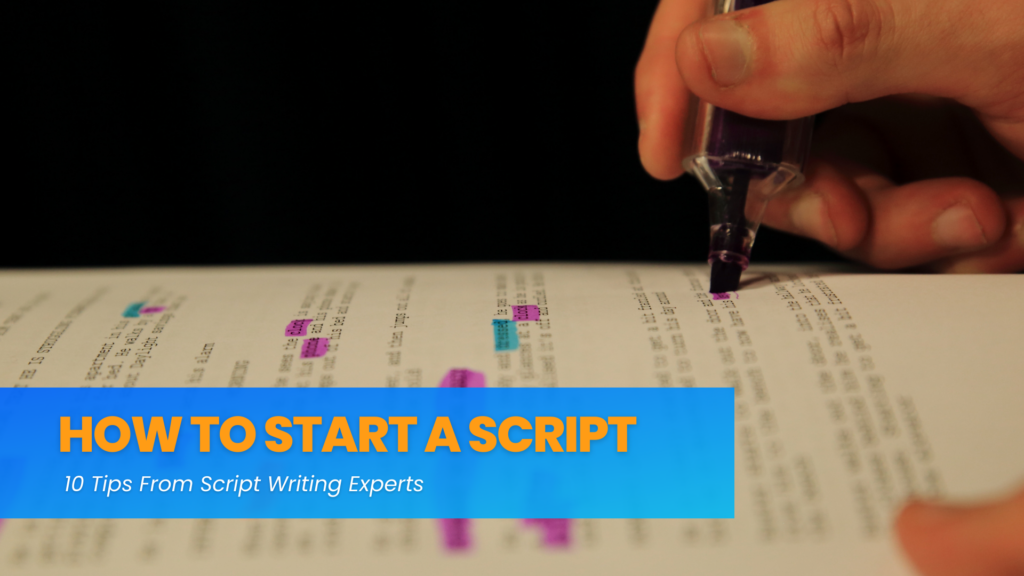Pull up a chair, my ambitious scriptwriter. Starting a script isn’t just about throwing words on a page. It’s about passion, precision, and a pinch of audacity. If you’ve felt overwhelmed with the blank page staring back at you, let’s turn that anxiety into an exhilarating opportunity. Here’s your ultimate guide to script writing. Prepare to be enlightened.
1. The Mighty Premise: Beginning the Journey
Let’s paint a picture: imagine going on a trip with no destination in mind. Sounds thrilling but also chaotic, right? That’s why we need a premise. It’s the seed from which your script-tree will grow. It’s essential to know your narrative’s purpose, and just as businesses require a mission statement, your script craves a captivating premise.
Action Step: Write down a one-sentence summary of your story. This will become the guiding light for your scripting adventure.
2. Characters: The Heart and Soul of your Script Writing Endeavor
Great businesses thrive on relationships. Your script is similar, relying on the intricate relationships between characters. Dive deep. Are they multifaceted? Do they have quirks, desires, or fears? These are the faces your audience will love, loathe, and everything in between.
Deep Dive: Sketch a detailed character profile. Physical attributes, past traumas, favorite foods—know them as you’d know a close friend.
3. Dive into Structures – The Backbone of Script Writing
Like the strong foundation of a towering skyscraper, the structure of your script holds everything together. Heard of the three-act structure? It’s a classic for a reason. It divides your story into Beginning, Middle, and End, providing a roadmap for your narrative journey.
Pro Tip: Familiarize yourself with different script structures – from the Hero’s Journey to the Five-Act structure. Adapt and experiment to find what resonates with your story.
4. Setting: Your Canvas
Just as an entrepreneur selects a strategic location for their startup, the setting of your script requires equal attention. Is it a war-torn dystopia? A serene village? The setting isn’t just a backdrop; it’s a character in its own right, influencing mood, character behavior, and plot dynamics.
Quick Exercise: Describe your setting in a paragraph. What are its sounds, scents, and sensations? Transport your reader there.
5. The Art of Dialogue: Less is More
Every successful marketer knows: It’s not about what you say, but how you say it. Script dialogue isn’t a space to showcase verbosity. Every line should either push the plot forward, reveal character, or ideally, both.
Masterclass Move: Read your dialogues aloud. If they sound unnatural or forced, rework them. Aim for authenticity.
If you’re on the prowl for expert tactics and strategies, definitely explore Script Writing Advanced Strategies. Craving more insights? Dive into perfecting your script’s timing and pacing and the techniques of staying razor-focused with a script timer.
6. Embrace Conflict – It’s the Spice
Every startup faces hiccups. Every hero faces challenges. Without conflict, your story is a flat line—and who wants that? Whether internal, external, or both, ensure your narrative has conflicts that challenge your characters and intrigue your audience.
Brainstorm Booster: List down potential conflicts your protagonist can face. Emotional? Physical? Social? The more varied, the richer your script.
7. Research, Research, and Research
The best business decisions are data-informed. Similarly, the most gripping scripts are well-researched. Even if you’re penning a fantasy, grounding certain elements in reality adds depth.
Golden Rule: Always validate facts. Whether it’s the details of a 1920s speakeasy or the mechanics of a futuristic gadget, accuracy matters.
8. Feedback is Golden
Imagine launching a product without a test run. Catastrophic, right? Your script needs fresh eyes too. Whether it’s friends, family, or professional script consultants, gather feedback. Remember, every critique is a step towards perfection.
Actionable Advice: Seek diverse feedback. Different perspectives can highlight various strengths and weaknesses in your script.
9. Script Writing Rhythms: Setting the Pace
Ever sat through a dreadfully long presentation? Pacing in script writing ensures your audience remains engaged. It’s about rhythm. Know when to speed up the action and when to allow moments of reflection.
Key Strategy: Review your script’s flow. Is there a balance between high-tension scenes and moments of calm? Adjust accordingly.
10. Lastly, Persistence!
Thomas Edison didn’t perfect the light bulb on his first try. J.K. Rowling didn’t become a sensation overnight. The path of creativity is paved with persistence. Embrace rejections, learn from them, and keep writing. Your script writing journey is a marathon, not a sprint.
Motivation Mantra: For every rejection, remember the countless icons who were once in your shoes. Use their stories as fuel.
So, there you have it, an all-encompassing guide to kickstarting your script writing journey. With these tools and tips, you’re not just starting a script; you’re embarking on a grand adventure. Remember, every script has the potential to influence and inspire. Be bold, be audacious, and most importantly, keep writing. Your audience awaits.
Three Things you can do to keep fast track of your learning:
- Connect on Linkedin as I share valuable lessons weekly.
- Fast track your learning: Get the 6 Steps plus 15 years of Hollywood and Agency experience in one Workshop and masterclass.
- Use the template: 18 Scripts that Sell (also included in every Script-Timer plan.)





